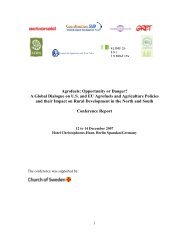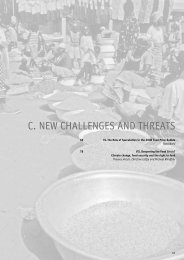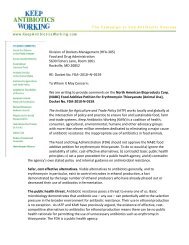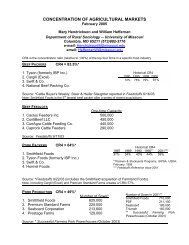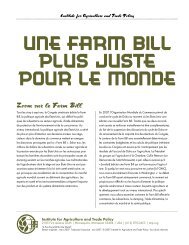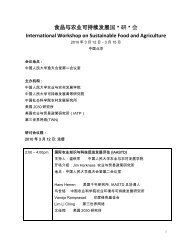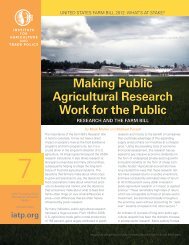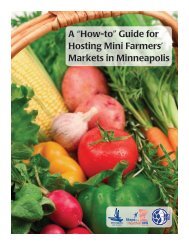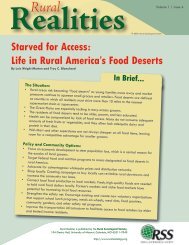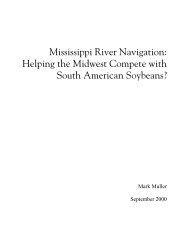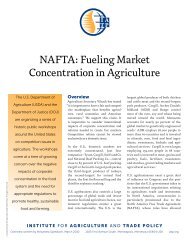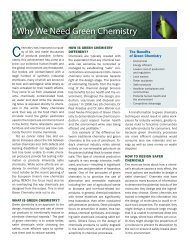Download this document - Institute for Agriculture and Trade Policy
Download this document - Institute for Agriculture and Trade Policy
Download this document - Institute for Agriculture and Trade Policy
Create successful ePaper yourself
Turn your PDF publications into a flip-book with our unique Google optimized e-Paper software.
It didn't hurt that when pension <strong>and</strong> index funds descended en masse into these markets, they found<br />
ready-made loopholes that enabled them to make much larger investments than they would otherwise<br />
have been able to.<br />
Consider the scale of the increase over the past seven years.<br />
In 2000, long-only speculative investors - that is, investors like these funds who are only betting that<br />
prices will climb higher - had committed about $4.7-billion to commodities, according to figures<br />
compiled by Gresham Investments, a New York firm specializing in commodities. That number has<br />
almost doubled every year since, hitting $80-billion in 2005, <strong>and</strong> $175-billion in 2007. As of today,<br />
most estimates peg total fund investment at approximately a quarter of a trillion dollars. Indeed, a study<br />
<strong>this</strong> month by Greenwich Associates found that almost 40 per cent of commodities investors have only<br />
been active in these markets <strong>for</strong> the past three years.<br />
Meanwhile, as <strong>this</strong> fund money stormed in <strong>and</strong> dem<strong>and</strong> rose, prices <strong>for</strong> a range of food staples, such as<br />
wheat, soybeans <strong>and</strong> corn, began escalating. Between 2000 <strong>and</strong> 2007, the price of wheat increased 147<br />
per cent on the Chicago Board of <strong>Trade</strong>. Over the same period, corn increased 79 per cent <strong>and</strong> soybeans<br />
72 per cent. In the past year, in particular, the price moves have been dramatic.The CFTC's moves to<br />
deregulate the sector, meanwhile, only inspired calls <strong>for</strong> more deregulation. As more funds piled in,<br />
stoking dem<strong>and</strong> <strong>for</strong> agricultural futures contracts, speculators began clamouring <strong>for</strong> more flexibility<br />
with trading limits.<br />
In 2005, the CFTC obliged by exp<strong>and</strong>ing trading limits on the amount of wheat, corn, oats <strong>and</strong><br />
soybeans that traders could buy or sell at any one time on the futures markets.<br />
Then, in 2006, Deutsche Bank <strong>and</strong> another undisclosed index fund operator asked the CFTC to exempt<br />
them from all trading limits, much as it had done <strong>for</strong> swap dealers.<br />
The CFTC didn't provide an outright exemption, but gave these two funds pretty much the same thing:<br />
a "no-action letter," assuring the funds that they would not be subject to penalties if they breached the<br />
limits.<br />
Last fall, after other funds began jockeying <strong>for</strong> similar treatment, the regulator issued a proposal to<br />
offer index <strong>and</strong> pension funds full exemptions, meaning they wouldn't have to go through a swap dealer<br />
to circumvent trading limits. The CFTC also asked <strong>for</strong> comments on a proposal to once again raise<br />
trading limits <strong>for</strong> speculative investors, such as hedge funds.<br />
For many in the food industry, who had begun to suspect a strong link between the market's wild<br />
swings <strong>and</strong> <strong>this</strong> influx of new fund money, <strong>this</strong> was the last straw.<br />
The One Hundred Years War<br />
On a Tuesday morning in late April, a group of more than 100 people shoehorned themselves into a<br />
cramped conference room in the Washington headquarters of the CFTC. There were farmers <strong>and</strong><br />
bakers, brokers <strong>and</strong> stock exchange officials, pension fund executives, professors, <strong>and</strong> even cotton<br />
growers, all convening <strong>for</strong> what was, by any measure, an extraordinary meeting: In the midst of<br />
skyrocketing prices <strong>for</strong> food <strong>and</strong> unheard of gyrations in futures contracts, the chief commodities<br />
regulator was trying to figure out whether the markets it oversees still worked properly.<br />
Almost immediately, fault lines emerged between the "commercial" players - farmers, grain elevators,<br />
processors, <strong>and</strong> anyone else directly involved in the food chain - <strong>and</strong> "speculators" - index funds,<br />
pension plans, hedge funds, <strong>and</strong> other investors who buy futures to bet on price movements, but who<br />
never intend to take physical possession of the commodity.



